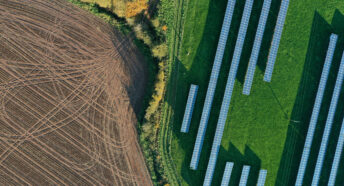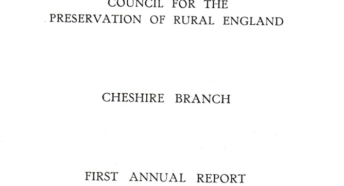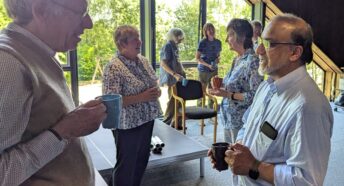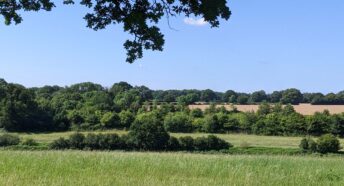Fracking ban in important countryside areas welcomed
CPRE Kent has welcomed the government’s commitment that there should be a ban on fracking in national parks, sites of special scientific interest and areas of outstanding national beauty.
Energy Minister Amber Rudd MP made the promise during a Commons debate last night (26 January) on fracking legislation in the government’s Infrastructure Bill.
“We are very pleased that the government has pledged to protect important landscapes under threat of industrialisation due to fracking. This would have had a devastating and irreversible impact on our countryside, so we are pleased these beautiful areas will be preserved,” said Richard Knox-Johnston, Vice President of CPRE Kent.
MPs also considered a report from the influential Environmental Audit Committee, published yesterday (26 Jan), which concluded that shale fracking should be put on hold because it is incompatible with climate change targets and could pose significant environmental risks to health and risk to our water supply.
CPRE Kent submitted evidence to the committee last month, detailing fears that fracking could damage the aquifer which supplies one million people with drinking water. The gas and oil deposits in East Kent are less than 600-700m below the aquifer, the Chalk of the North Downs. There is also a risk that geological faults in the area would be re-activated, allowing gases and fracking fluids to leak into the chalk and so contaminate the water supply.
The Environmental Audit Committee Chair, Joan Walley MP, said: “There are huge uncertainties around the impact that fracking could have on water supplies, air quality and public health.”
CPRE Kent is further concerned about regulation of fracking sites and is campaigning for regulators independent of Government to ensure proper supervision.
Graham Warren, Chairman of CPRE Kent’s Environment Committee said. “We know that for East Kent to reach any gas bearing shales it would be necessary to drill through 250m of the Chalk of the North Downs. These shales lie within a dense network of geological faults and we fear fracking would trigger further movement on these faults and create pathways for the flow of noxious gases and liquids into the aquifer.”
“We also have serious doubts about the effective regulation of the operation, which would require 24-hour on-site monitoring by competent, independent inspectors. We question how this would be achieved when the regulatory bodies are already insufficiently staffed and facing further cuts.”
To hear Graham Warren explain some of the risks of fracking in East Kent on video clip click here
January 27 2015
- A number of important documents have yet to emerge. For example, a rigorous transport plan and a finalised air-quality assessment. The latter is critical given that allocations at Teynham will feed extra traffic into AQMAs.
- There seems to be no coherent plan for infrastructure delivery – a key component of the plan given the allocations being proposed near the already crowded Junction 7.
- There seems to have been little or no cooperation with neighbouring boroughs or even parish councils within Swale itself.
The removal of a second consultation might have been understandable if this final version of the plan were similar to that being talked about at the beginning of the consultation process. It is, however, radically different in the following ways:
- There has been a major shift in the balance of housing allocations, away from the west of the borough over to the east, especially around the historic town of Faversham. This is a move that raises many concerns.
- A new large allocation, with accompanying A2 bypass, has appeared around Teynham and Lynsted, to which we are objecting.
- Housing allocations in the AONB around Neames Forstal that were judged “unsuitable” by the council’s own officers have now appeared as part of the housing numbers.
- Most of the housing allocations being proposed are on greenfield sites, many of them on Grade 1 agricultural land – a point to which we are strongly objecting.
Concerns about the rush to submit the plan
The haste with which the plan is being prepared is especially worrying given the concentration of housing in Faversham. If the town is to take a large amount of new housing, it is imperative that the policies concerning the area are carefully worked out to preserve, as far as possible, the unique nature of the town. The rush to submit the plan is likely to prove detrimental.
As Swale does not have a five-year land housing supply, it is open to speculative development proposals, many of which would run counter to the ideas contained in the current plan. Some are already appearing. This is a common situation, and one that, doubtless, is a reason behind Swale’s haste.
Our overriding fear, however, is that this emphasis on haste is ultimately going to prove counterproductive. This is because it is our view that the plan, in its current form, is unlikely to pass independent examination. We are urging Swale to listen to and act upon the comments being made about the plan and to return the plan to the council with appropriate modifications before submitting it to the Secretary of State.
Essentially, this means treating the current consultation not as the final one but as the ‘lost’ second consultation.
The consultation ends on Friday 30 April and we strongly urge residents to make their opinions known if they have not already done so.
Further information









